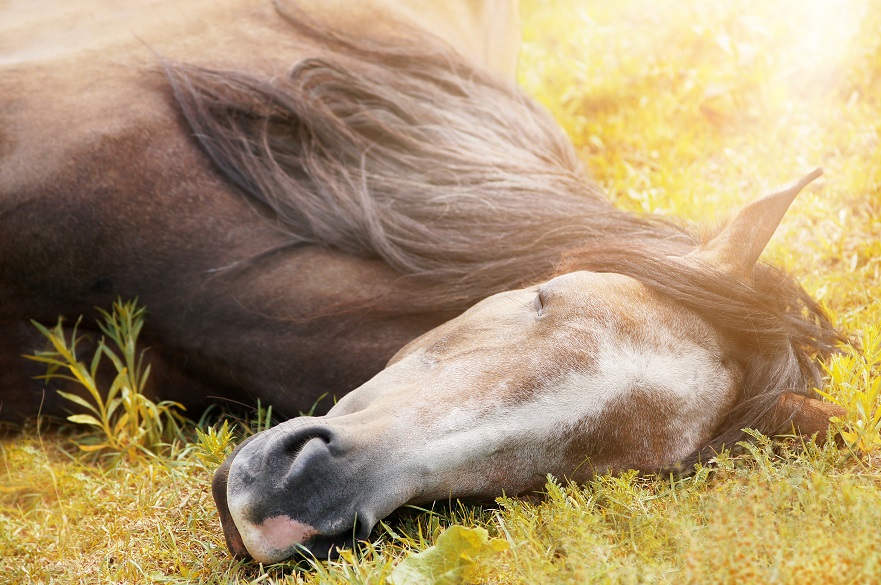Could horses’ sleep patterns act as early warning for their ill health?
Scientists are monitoring night-time sleep in horses as part of a study which aims to see if equine rest patterns could provide early warnings about their ill health.
By Dave Rogers | Published on 7 July 2020
Categories: Press office; Research; School of Animal, Rural and Environmental Sciences;

Researchers at Nottingham Trent University want to see if they can identify specific patterns of rest for individual horses, as well as the factors that might be influencing rest – such as exercise, temperature, age and personality.
The researchers hope that if they can find what a ‘normal’ rest pattern is for a particular horse then any deviation from this may alert owners to the fact that something is wrong.
Horses have two phases of sleep – slow wave sleep (SWS) and rapid eye movement (REM) sleep – and while it is well-known that horses can sleep standing up, this is only true for the SWS phase.
To achieve REM sleep and their full sleep cycle – which is important for physical and mental welfare – horses must lie down.
Evidence suggests horses may experience sleep deprivation if they are unable to lie down to achieve the REM phase of sleep – and this could be due to injury or illness making it too painful, or stress if they don’t feel safe in their environment.
Because horses often sleep at night and most owners can’t monitor their rest patterns, this lack of sleep can go unnoticed until the symptoms become extreme.
The university study involves analysing videos of night-time behaviour of healthy riding school horses over multiple nights and recording other details specific to each horse.
Another part of the project is using accelerometers which automatically record movement and remotely monitor horses’ night time behaviour.
“We’re hoping that over multiple nights we can identify rest patterns unique to individual horses and what might be influencing that pattern,” said Kym Griffin, a PhD equine researcher in Nottingham Trent University’s School of Animal, Rural and Environmental Sciences.
She said: “Horses don’t need as much sleep as humans, typically only three to five hours a night, with about 30 minutes of REM sleep. But that REM sleep is very important for their physical and mental welfare so it’s important to ensure they are getting it every night.
“If they’re not getting the sleep they need, there could be a reason for that and it could be an early sign that something isn’t right.
“The challenge is that, much like humans, there is a lot of variation in how much time an individual needs to rest each night. Rest patterns can be influenced by a range of factors and so we need to investigate these to enable us to better understand each animal’s normal sleeping pattern.
“We will also be collecting data on racehorses as part of this work, because what is normal for one group might not be for another.”
Notes for Editors
Press enquiries please contact Dave Rogers, Public Relations Manager, on telephone +44 (0)115 848 8782, or via email.
Nottingham Trent University was named University of the Year 2019 in the Guardian University Awards. The award was based on performance and improvement in the Guardian University Guide, retention of students from low-participation areas and attainment of BME students. NTU was also the Times Higher Education University of the Year 2017, and The Times and Sunday Times Modern University of the Year 2018. These awards recognise NTU for its high levels of student satisfaction, its quality of teaching, its engagement with employers, and its overall student experience. The university has been rated Gold in the Government’s Teaching Excellence Framework – the highest ranking available.
It is one of the largest UK universities. With nearly 32,000 students and more than 4,000 staff located across four campuses, the University contributes £900m to the UK economy every year. With an international student population of more than 3,000 from around 100 countries, the University prides itself on its global outlook. The university is passionate about creating opportunities and its extensive outreach programme is designed to enable NTU to be a vehicle for social mobility. NTU is among the UK’s top five recruiters of students from disadvantaged backgrounds and was awarded University of the Year in the UK Social Mobility Awards 2019.
A total of 82% of its graduates go on to graduate entry employment or graduate entry education or training within six months of leaving. Student satisfaction is high: NTU achieved an 87% satisfaction score in the 2019 National Student Survey.